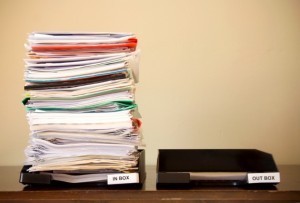The New Way to Organize: Don’t
 Is the notion of “getting organized” a thing of the past? Are we spending too much time shuffling paper, digging for information and filing it away for easy-retrieval, when these acts alone may be the true cause of our inefficiency?
Is the notion of “getting organized” a thing of the past? Are we spending too much time shuffling paper, digging for information and filing it away for easy-retrieval, when these acts alone may be the true cause of our inefficiency?
Michael Schrage from the Harvard Business Review thinks so. He says the way people interact with their technology has effectively eliminated the need for basic practices like filing, researching and other anal-retentive systems. He says “It’s not that we’re becoming too dependent on our technologies to organize us; it’s that we haven’t become dependent enough.” In other words, if we gave less time and thought to organizing our world and more attention to our daily habits and desired outcomes, we can all save ourselves – both personally and institutionally – a lot of time.
For example, gone is the need to create and manage complex email filing systems. IBM researchers found that among workers who “searched” for keywords, they found the correspondence they were looking for faster and with fewer issues over those who spent time digging through organized folders. Careful categories and archive systems didn’t improve retrieval success; a simple “search” paired with email threading did.
A few years ago, I myself ditched a meticulously sub-foldered inbox for one of total chaos and abandonment. People may be shocked to learn that I no longer archive, I barely use filters and I never, ever delete. My inbox is a monstrosity of a mess with over 20,000 emails (explained by several group lists and an above-average amount of spam) yet I almost always find what I’m looking for with only a few keystrokes. I use Gmail, and though this email client has has far more tools than I actually use, if my relative level of functionality is any indication, we can all probably stop trying so hard.
Because technology is headed in the “on-the-go” direction anyway. Siri is like a personal assistant who’s job description is to spare her boss (you) the time and hassle of having to organize at all. That’s because we don’t use Siri to remind ourselves to put an event into our calendar or keep track of a task; we simply have her do the task itself.
As irritatingly smug as it sounds, with today’s technology we don’t have to organize the world — we can demand that the world organizes itself around us. Soon all meeting invitations will instantly sync with events on our calendars, our documents and music will be seamlessly accessible from anywhere at all times, and we’ll be able to interact with the world on our phones exactly like we do on the web (prompting some business insiders to claim apps will soon be a thing of the past). And remember when the thought of not printing out an email for the record books or paper-filing every copy of every bank statement was sacrilege — even foolish? Yet increasingly, electronic options are making paper obsolete.
So until the logistics of our world are perfectly effortless, here are a few tips to help streamline the chaos instead of trying to wrangle it:
Use Filters
Filters and tags are the new folders. Instead of tediously filing emails yourself, tell your mail client what parameters you prefer and it should be able to do most of the work for you. Set up a filter to tag your correspondence as relating to “work”, “personal”, “travel”, and “promotions”, which all can be hidden — or not — from your inbox. And if you spend a few extra seconds to teach your computer which emails are spam and which should be flagged as important, it will do this for you and reducing inbox clutter.
Invest in a Scanner
This is a tool that can take boxes of tax records, binders full of paper and piles of receipts — and make them all disappear. Important documents can be scanned and filed in organized way either in the Cloud or on a tiny portable hard drive. Just make sure to back up in at least two places.
Get a Shredder
Now that you’ve scanned and saved all your electronic documents, what do you do with all that paper you’re eliminating? The safest thing is to shred it, and then recycle it. And then stop further paper clutter by opting for “paperless” statements from your bank, utilities etc.
Back it Up
Matter of fact, back-up in a few places. In addition to cloud synching, invest in another form of duplication, whether a professional back-up service, or with a a good old fashioned hard-drive.
No matter what our level of comfort with technology, if we concede that it’s there to support us and not slow us down, we can really move forward.
Photo Courtesy of: michaelhyatt.com




